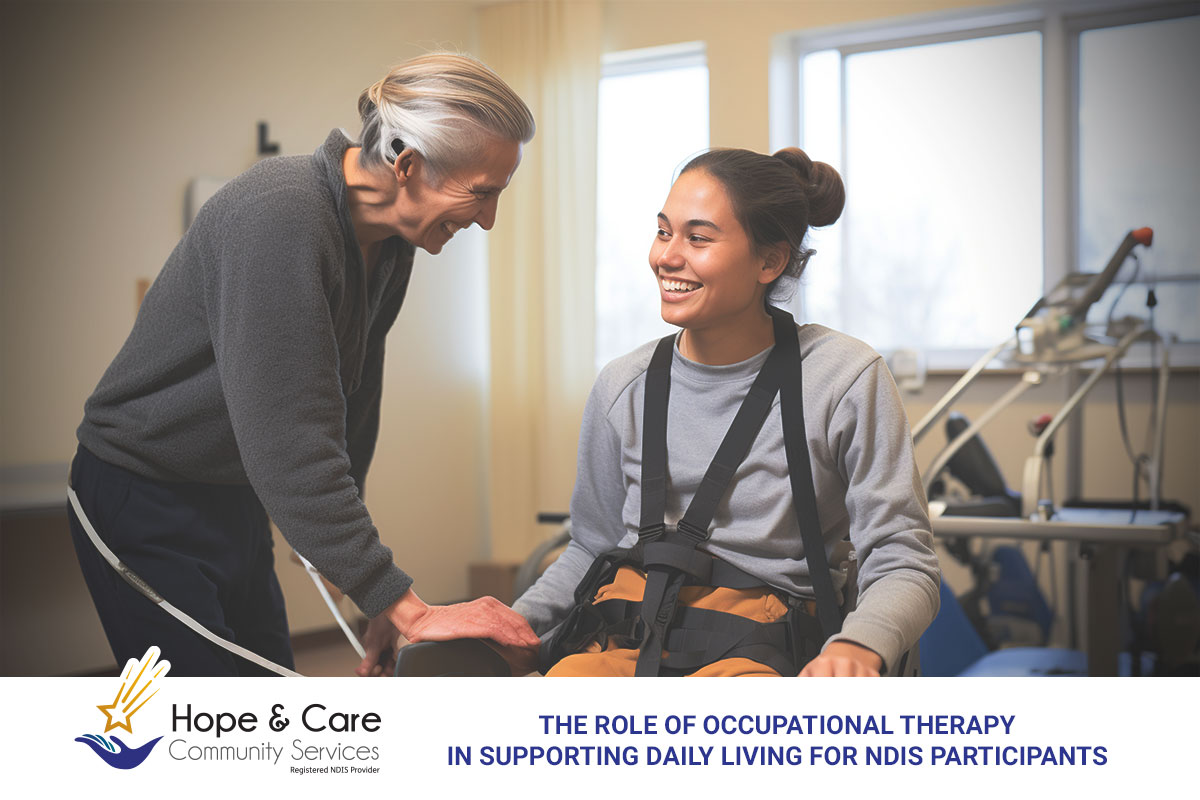
Occupational therapy plays a crucial role in the lives of many National Disability Insurance Scheme (NDIS) participants. At Hope & Care Community Services, we understand that daily living tasks, which many take for granted, can be challenging for individuals with disabilities. This is where occupational therapy comes in—supporting participants in leading more independent, fulfilling lives by enhancing their ability to perform everyday activities.
What is Occupational Therapy?
Occupational therapy is a client-centred health profession focused on helping individuals participate in the daily activities that bring them meaning and satisfaction. For NDIS participants, this often means working with a skilled therapist to improve their ability to engage in essential daily tasks or modifying their environment to better support their independence.
Additionally, occupational therapists are highly trained professionals who work across various settings, including homes, schools, workplaces, and community centres. They assist individuals affected by physical, intellectual, and developmental disabilities, as well as those managing chronic conditions and mental health challenges. In many cases, this support is crucial for enabling individuals to lead more empowered lives.
How Occupational Therapy Supports Daily Living
The primary goal of occupational therapy is to enable individuals to live as independently as possible. This support can take many forms, depending on the unique needs of the participant. Some of the key ways occupational therapists support daily living include:
- Personal Care: Occupational therapists help participants develop the skills needed for daily self-care activities such as dressing, bathing, and grooming. For individuals who struggle with these tasks, therapists may suggest adaptive techniques or assistive devices to make these activities easier and safer.
- Household Tasks: Managing a home involves many tasks, from cooking to cleaning to laundry. Occupational therapists work with participants to break down these tasks into manageable steps, providing guidance on how to perform them independently. This might include teaching new ways to approach tasks or recommending modifications to the home environment.
- Environmental Modifications: Sometimes, the physical environment can pose challenges to daily living. Occupational therapists assess the participant’s living space and recommend modifications that can make it more accessible and functional. This might include installing grab bars in the bathroom, adjusting kitchen counters to wheelchair height, or suggesting changes to the layout to improve mobility.
- Community Participation: Beyond the home, occupational therapists support participants in engaging with their broader community. This might involve helping them develop the skills needed to use public transport, participate in social activities, or even pursue employment opportunities.
The Benefits of Occupational Therapy for NDIS Participants
For NDIS participants, the benefits of occupational therapy are vast and impactful. Here are some of the key ways this support can enhance daily living:
- Increased Independence: By building skills and making environmental adjustments, occupational therapy empowers participants to perform daily tasks on their own, reducing their reliance on others. Consequently, this independence can lead to greater confidence and a stronger sense of self-sufficiency.
- Improved Quality of Life: Independence often leads to a greater sense of control and satisfaction in life. When participants can manage their personal care and household tasks, they typically experience higher self-esteem and a better overall quality of life. As a result, they may feel more motivated to pursue other activities and goals, further enhancing their wellbeing.
- Enhanced Safety: Many daily activities, particularly in the home, come with risks—such as slipping in the shower or struggling to cook safely. Occupational therapy addresses these risks through education, skill-building, and environmental modifications, making daily life safer for participants. Additionally, therapists may provide training on emergency procedures or offer tips on reducing hazards in the home, further ensuring the participant’s safety.
- Social and Economic Participation: Occupational therapy does not just focus on the home. It also supports participants in engaging with their communities, whether through social activities, volunteering, or employment. This broader engagement is key to living a full and meaningful life. Likewise, being active in the community can provide participants with a sense of purpose and contribute to their overall happiness.
How Hope & Care Community Services Can Help
At Hope & Care Community Services, we are dedicated to providing high-quality occupational therapy services that align with the needs and goals of our participants. Our approach includes:
- Comprehensive Assessments: We begin by conducting thorough assessments to understand the participant’s current abilities and challenges. This helps us tailor our services to meet their specific needs. In turn, these assessments form the foundation for developing a support plan that is both effective and personalised.
- Personalised Support Plans: Based on the assessment, we work with participants to develop a personalised support plan. This plan outlines the goals of therapy and the steps we will take together to achieve them. Additionally, we ensure that each plan is adaptable, allowing for adjustments as the participant’s needs evolve over time.
- Ongoing Support and Monitoring: Progress is monitored regularly, and adjustments are made as needed to ensure that the therapy remains effective and aligned with the participant’s evolving needs. Furthermore, this continuous support helps to reinforce learning and ensure that the participant continues to make strides towards their goals.
Conclusion: Empowering Daily Living Through Occupational Therapy
Occupational therapy is an essential service that supports NDIS participants in leading more independent, fulfilling lives. By focusing on the skills needed for daily living and making necessary environmental modifications, occupational therapy helps individuals overcome the challenges they face and engage more fully with their world. At Hope & Care Community Services, our experienced occupational therapists are here to help you or your loved ones navigate daily living challenges with confidence and support. We believe in empowering our participants to achieve their goals and live life to the fullest. If you or someone you know could benefit from occupational therapy, we are here to provide the expertise and care you need.
Finally, as Registered Provider, we understand the intricacies of the navigating services on your own. Unlock the full potential of your funding and provide the guidance you need to reach your goals. Feel free to Contact Us to explore how we can assist you on your journey. For instance, the NDIS is there to make a positive difference in your life, and we’re here to help!.
Want to learn more? Read other articles :
- Redefine Independence your own way – with HCCS
- Who’s Who: The Key Terms of Your NDIS Plan
- Foundational Supports: Building Blocks of NDIS Success
HCCS is a registered NDIS provider. Learn more about our services.
♥ We are available in Brisbane! – Our team is just a call away!
